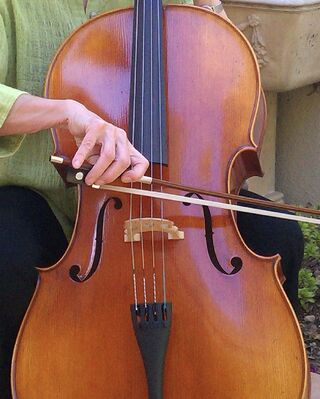Memory
Virtual Music Camp
Music’s can enchant and transform, even when played remotely.
Posted October 1, 2020

Music evokes potent and meaningful feelings and provides a powerful link to past events.
As a child of the '50s and '60s, when I listen to music from that era I can recall exactly what I was doing at that moment, and often the person with whom I shared the experience. Almost any song by The Beatles, Bob Dylan, or Fleetwood Mac takes me back to that sliver of time and place giving me access to long-buried memories of who I was then. It stirs sweet emotions and also the angst of teenage drama. More than that, it reflects our unique history and culture cemented in time. It has the capacity to touch us deeply.
The ability to reflect and enjoy snippets of the past, even from long ago, is a hallmark of our species. It has always been this way from the beginning of human time. And music is one of our oldest forms of communication, likely predating language. It resonates with life itself. Like a heartbeat, music provides a rhythm that is uniquely comforting. This is why all cultures going back to our cave-dwelling ancestors have used flutes and drums, dances, and song to convey stories, emotions, history, religion and so much more.
The field of neuroscience is a newcomer to the study of music but it has much to say about the parts of the brain stimulated by music and the ability of music to make us feel deeply. Using fMRI while people are either listening to or playing a musical instrument shows the brain lighting up like a fully adorned Christmas tree. Many parts of the brain respond to music, especially those that relate to movement, pleasure, language, and memory. Oliver Sacks, M.D., neurologist and best-selling author of books with neurological themes for everyday people, wrote that “Music has more ability to activate more parts of the brain than any other stimulus.”
As a psychologist at age 70, I embarked on a personal odyssey—to learn to play the cello. My attraction to this oversized instrument was multifaceted: its mellow, velvety, haunting sounds radiating from its polished wood exterior, warm and smooth to the touch. When I wrap my arms around its body-sized dimensions, I can feel powerful vibrations as I bow the strings. Quite a delicious sensation.
That was a good enough reason and starting point for dedicating myself to learning. Here I was, pursuing the life of an artist. I use the term artist very loosely, of course. No matter that I had a late start. All that’s required is openness and a child’s fascination with the experience, which the Buddhists call “a beginner’s mind.”
If you start with limited performance expectations you can have the best possible experience for its own sake. No worries about getting more proficient, competing with, impressing others, or having any particular goal outside of enjoyment. No need to prove yourself or worry about what others think about your choices. You are finally free to explore and choose options without the nagging should and goal-driven pressures that defined past times. That’s the payoff for an over-sixty mindset!
That’s exactly how I tried to approach my cello playing. For years I played alone or with my teacher but dodged playing with others. I was sure I wasn’t ready, or good enough, in spite of what I said above about performance not mattering. One day I took a risk and began to play duets with another cello player. And then it was a quartet with two violins, a viola and me. Finally, I was ready to explore music camp.
Though tentative about the whole endeavor, I was immediately hooked by the caring musicians, coaches, and the pristine setting with dormitory-style rooms and like-minded students, mostly older adults playing for fun. The former monastery that transformed into our camp provided the perfect serene location for making music in the woods.
Like summer camps in general, the setting was picture-perfect, located in Sonoma County, California, where vineyards are interspersed with dairy cattle ranches in the green rolling hills. The accommodations and foods are simple but good enough. The experience reminds me of camp life from a 10-year-old’s perspective. But it's so much more. The point of music camp is to create superb music in a supportive and sharing environment. It’s not luxurious but if that is what you want, take a cruise!
Summer after summer, I went to camp, even after a devastating forest fire a few summers back sadly consumed the facility where camp was usually held. We were fortunate to find a new but similar facility, and camp life went on as usual. Except for this year.
The summer of 2020 was different. The coronavirus preempted camp, as it has continued to gobble up many other planned events worldwide. But “string camp” happened anyway, carried on virtually. Imagine 20+ violinists, violists, and cellists playing with each other and coaches via Zoom all day, every day for four days, along with a final orchestral music performance? It wasn’t ideal but in some ways, it was even more intimate—with many more one-on-one and duet opportunities.
For a finale, a piece by Shubert was carefully cobbled together electronically to give the illusion of a string orchestra playing together, but in reality, it consisted of separately recorded parts played by more than a dozen campers and several coaches. And it was magical. Maybe it won’t get any music reviews in the New York Times but it was a work of art, and artists who will cherish the memory have a recording to refresh their souls over time.
I can’t wait until life returns to normal, as I assume it someday will. In the meantime, I sit with my cello every day and practice. And in my world of music, I carry on as if nothing has changed, though I know that day-to-day has been immeasurably harder for lots of folks. In the room where my cello sits, and my music-stand bulges with pieces to practice, my life is unchanged and sane in an otherwise topsy-turvy world.




